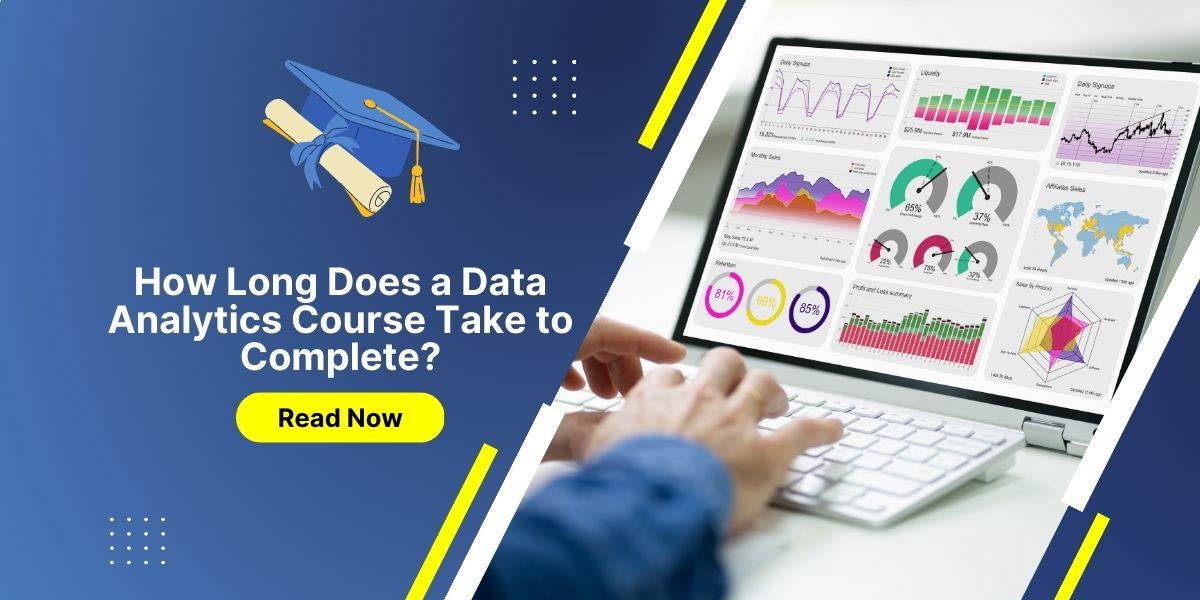A data analytics course is specially designed to help prospective data analysts learn data analysis using cutting-edge technology to drive proactive decision-making and optimize business performance. The data analytics course is extremely popular among young students, graduates, and even professionals, as data analytics skills are among the most sought-after skills by employers of top organizations. As a result, data analytics courses are offered at various levels, including certification, diploma, graduate, and also post-graduate levels, as a stream of computer science and management. Therefore, the duration of a data analytics course primarily depends on the type and level of course you choose.
For example, a data analytics certification program might take around 6 to 9 months. In contrast, a diploma program typically takes one year, whereas most post-graduation or master’s courses take two years.
Irrespective of the duration of the academic program, the data analytics courses represent a unique opportunity to master the in-demand skills required to analyze data on a massive scale and develop fundamental skills needed to solve critical business problems with data. Whether you are looking for a mid-career leap, a data analytics course can help you enter the lucrative field of data analytics. Among many courses offered in the data analytics domain, diploma programs have gained tremendous popularity for their holistic curriculum, focusing on theoretical and practical aspects of data analytics.
A diploma in data analytics can be a great way to start a career in this emerging and in-demand field. Interestingly, diploma programs in data analytics are best offered in renowned Canadian institutions. Canada is one of the top destinations for international students to study data science and analytics. The diploma program in data analytics in Canada also offers a Co-op semester, allowing students to integrate their classroom learning with relevant work experience.
What is data analytics?
Data analytics is the process of collecting, cleaning, analyzing, and visualizing data to gain insights into patterns and trends. It’s a powerful tool for businesses and organizations of all sizes, and it can help you improve decision-making, optimize processes, and uncover insights that you wouldn’t be able to find otherwise.
Data analytics can be used for a variety of purposes, ranging from understanding customer behavior to predicting future trends. It’s a versatile tool that can be used in many different ways, making it an invaluable asset for any organization.
Benefits of data analytics
The benefits of data analytics are numerous. It can help you identify trends and patterns that would otherwise be hidden in the data. It can also give you a better understanding of customer behavior and preferences, allowing you to better tailor your services and products.
Data analytics can also be used to optimize operations and processes, resulting in more efficient operations. Finally, data analytics can be used to uncover insights that can help you make better decisions and provide a competitive edge.
The one-year diploma program in data analytics helps develop in-demand skills and knowledge to carve a futuristic career in data analytics. This program allows students to gain experience in handling data to gain informative and valuable insights using analysis software, such as SAS, Structured Query Language (SQL), and theoretical concepts in data designing and handling. That’s not all. The emphasis is also on helping students learn specialist data visualization packages and tools, such as D3, Tableau, and Qlik Sense, to visualize data. Most importantly, the students are introduced to R, the leading programming language in data science and statistics.
Throughout the one-year academic program, the following modules are covered:
- Data Handling and Decision Making
- Data Design
- Data Visualization and Interpretation
- Working with data using SAS and SQL
These are the modules covered under a diploma program in data analytics. However, the topics can differ with different institutions.
How to choose the right data analytics course?
Choosing a data analytics course amidst many certifications, diplomas, and degrees can be daunting. Therefore, you must ask yourself these questions before committing to a course.
- How much do you want to spend on the data analytics course?
- How and where do you want to study?
- What certification, diploma, or degree will you need for your career?
- What skills are you looking forward to gaining?
These are some questions you should ask yourself before selecting a data analytics course. However, a diploma in data analytics is an academic course that fulfills nearly all the requirements of a structured course.




